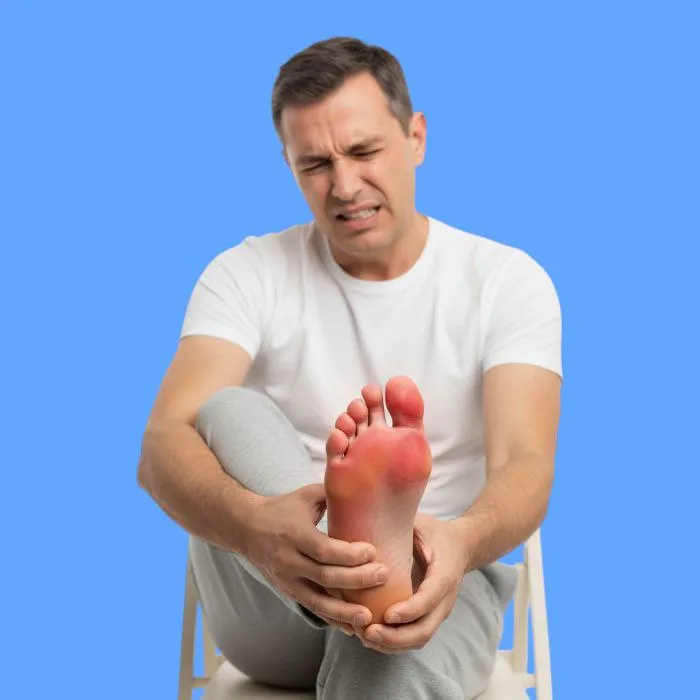What is gout?
Gout is a type of arthritis caused by a buildup of uric acid in the blood, leading to the formation of sharp crystals within the joints.
Gout causes sudden, severe pain, most often affecting the big toe joint, but it can also affect the ankles, knees, and hands.
It is a highly manageable condition with early diagnosis and a healthy lifestyle.
What are the causes of gout?
There are several common causes of the disease, including:
- High uric acid levels in the blood.
- Excessive consumption of red meat and seafood.
- Excessive consumption of alcohol or soft drinks.
- Obesity and lack of physical activity.
- A family history of gout.
What are the common symptoms of gout?
There are several common symptoms a patient may experience, including:
- Sudden, severe pain in the affected joint.
- Swelling and marked redness in the affected area.
- Heat in the joint with difficulty moving it.
- A tingling or burning sensation in the joint after an attack.
- Recurring attacks in the same joint over time.
When should you see a doctor?
It is recommended to see a doctor in the following cases:
- Severe pain persists for more than two days.
- Sudden swelling in the joint without an obvious cause.
- Fever accompanied by pain.
- Difficulty moving or walking due to the affected joint.
- Recurring attacks of pain within short periods.
What are the methods for diagnosing gout?
The disease is diagnosed using several methods, including:
- Physical examination to identify the affected joint.
- Blood test to measure uric acid levels.
- Joint fluid examination to detect crystals.
- X-rays to assess joint condition.
- MRI in advanced cases.
What are the methods for treating gout?

There are several methods for treating the disease, including:
- Taking anti-inflammatory drugs to relieve pain.
- Using medications that reduce uric acid production.
- Drinking adequate amounts of water daily.
- Reducing the intake of red meat and fatty foods.
- Completely avoiding alcohol and carbonated drinks.
Is it possible to cure gout?
There are several factors that affect the possibility of recovery from the disease, including:
- The level of uric acid in the body.
- The patient's commitment to diet and medication.
- Exercise and maintain a healthy weight.
- Avoid unhealthy eating habits.
- Regular follow-up with a doctor to avoid recurrent attacks.
What are the tips for preventing gout?
There are a number of tips for preventing the disease, including:
- Drink water regularly to flush uric acid from the body.
- Eat fresh fruits and vegetables daily.
- Limit your intake of animal protein and foods high in fat.
- Maintain an ideal weight.
- Exercise moderate physical activity regularly.
What are the potential complications of gout?
Some complications may occur if treatment is neglected, such as:
- The formation of hard lumps under the skin known as tophi.
- Permanent joint damage.
- Kidney stones resulting from uric acid accumulation.
- Chronic arthritis and difficulty moving.
- Increased risk of heart and kidney disease.
Frequently Asked Questions About Gout
Does gout affect men more than women?
Yes, it affects men at a higher rate, especially after the age of 30.
Can gout be prevented through proper nutrition?
Yes, avoiding fatty foods and soft drinks reduces the risk.
Is gout linked to kidney disease?
In some cases, high uric acid levels lead to the formation of kidney stones.
Can gout recur after treatment?
Yes, if the patient does not adhere to the diet and preventive treatment.
Article Summary
Gout can be easily controlled if detected early and appropriate treatment is followed.
Reducing foods rich in purines, drinking plenty of water, and maintaining a healthy weight are effective prevention steps.
Regular follow-up with a doctor helps avoid painful attacks and improve quality of life.